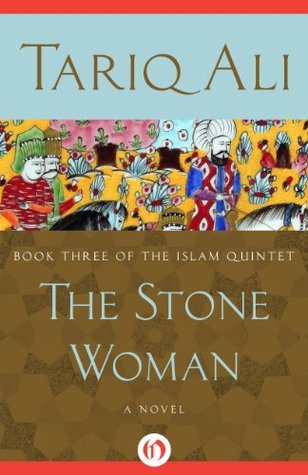The history of Iskender Pasha's family mirrors the growing degeneration of the Empire they have served for the last five hundred years. This passionate story of masters and servants, school-teachers and painters, is marked by jealousies, vendettas and, with the decay of the Empire, a new generation which is deeply hostile to the half-truths and myths of the 'golden days.'
The Stone Woman is the third novel of Tariq Ali's 'Islam Quartet'. Like its predecessors—Shadows of the Pomegranate Tree and The Book of Saladin—its power lies both in the story-telling and the challenge it poses to stereotyped images of life under Islam.
Comment: I was taking a borrowed book back to the library when I saw this one in a feature shelf they have, which suggests titles to readers of different genres.
I had never heard of the author but the blurb seemed promising so I decided to impulsively bring it with me. Since I didn't want to let it wait to long I started it rather quickly and this ended up being an interesting read, no matter how cliché it sounds.
This story is focused on a family from Istanbul in 1899 and when the temperatures are too high, the family goes south to a summer house where they could rest.
The plot of this story is, therefore, set during one of those summers and it's told from the perspective of Nilofer, one of the daughters of the owner of the house and the family chief, Iskander Pasha. During this plot, the family also copes with a stroke of Iskander and how each family member sees their lives under the Ottoman empire and the particularities of their domestic trials.
This is a unique view on Muslim traditions in a way western people wouldn't think considering nowadays' reality.
This is a book part of a series. In fact, apparently, this is the 3rd installment but as usual when in think about connecting series, it's not necessary to have read the previous ones to understand the plot.
I was quite curious to see how the author would mix the Turkish and Muslim identities clearly depicted in this book. I was curious to see a side of these cultures by someone describing a fictional tale, since there is still a lot of unknown facts about this side of the world (and culture) in relation to western locations. Although we didn't have that much in terms of politics and history, I'd say there's enough content to let one think.
The story is told from Nilofer's POV and we manage to follow a lot by her interactions with the characters. There are a few chapters which are told from other characters but it's as if it's part of a confession so, not always part of the action; more an explanation for some facts/situations described or alluded to through the novel.
With this I must say that part of the reason we, the reader, are able to know some things out of the normal continuity of the plot is because the family has had the habit, through generations, to sort of confess or vent their feelings to a statue called the stone woman, which we learn is an ancient image of the Virgin Mary, which the Muslims consider a holy woman, the mother of another holy man (Jesus for them, is another type of saint/sacred person but not the son of God).
With this tactic we get to learn several things about the character's feelings and lives and other situations as well.
Most of the story, though, is told by Nilofer. I don't think I liked her that much for the way she is described, it seems she is a little fickle and inconstant and not very loyal (emotionally speaking). I just didn't like her much so it was difficult to care about what she was going through. I actually liked other secondary characters more but the focus wouldn't be on them as much as I would have preferred.
There are many philosophical discussions between the characters and engaging ideas to think about. This aspect of the novel was interesting, even if a little difficult to put into perspective if one isn't much familiar with the oriental cultures and the History of Turkey or the Ottoman empire. I mean, the discussions had great points but it's not that easy for the unaware reader to think of them in terms of how it would have affected History had things happened a different way.
I think that, for those who don't usually read books featuring the aspects I mentioned, this is a good novel to start. It's easy, simple and the fictional tale filled with the usual stuff (family drama, sex, relationships...) and offers sufficiently intriguing themes. However, deep down, it's not as literary as I imagined although I can't say that is such a bad thing. I was curious enough to read it in a row but I don't know if I'll jump to another that quickly.
Grade: 6/10

No comments:
Post a Comment